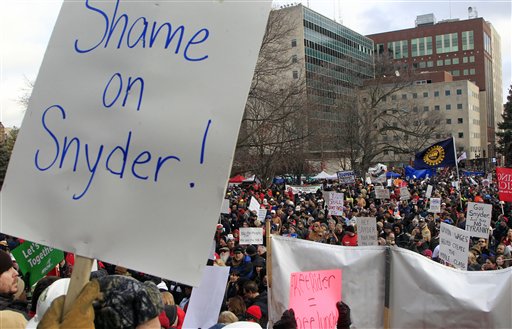Clik here to view.

Protestors rally against right-to-work legislation prior to its passage in mid-December.
Those dues help buy political influence in Lansing and Washington, D.C., as well as fund bargaining and pay administrative staff and office rent, among many other things.
Once Michigan begins to integrate controversial right-to-work legislation in late March, passed by the Republican-controlled state legislature in December, workers will have the freedom to choose whether to pay union dues in workplaces that are currently closed shops.
Clik here to view.

University of Michigan's central campus
The legislation won't affect current union contracts. Yet once existing contracts expire, employees will be free to decide whether to pay dues, but they still will be covered by union-negotiated contracts either way.
Trade organizations fear that workers' new ability to opt out of paying dues will significantly curtail union resources.
At the University of Michigan employees paid, at minimum, a hefty $5.36 million in dues last fiscal year.
There are roughly 11,800 employees who had their union fees taken out of their university paychecks from July 1, 2011, to June 30, 2012, according to a university spokesperson. Fees amount to an average of roughly $450 per employee per year.
Those employees belong to 11 unions, representing a range of U-M employees from nurses to theatrical stage employees to medical residents to maintenance staff. Other working groups, such as tenured faculty and administrators, are not unionized.
"We have to rethink everything. Within this coming year, we're going to have a huge budget impact, so we're trying to re-evaluate how we're going to allocate our resources," said Bonnie Halloran, president of U-M's lecturers union, the Lecturers' Employee Organization, for the past 10 years. LEO's labor agreement with U-M expires in mid-April and it will likely be the first U-M trade organization to feel the full impact of right-to-work legislation.
"We're projecting that we could potentially lose half our revenues. And that's very optimistic," continued Halloran, who says it will likely take the union a full two years before it understands the full impact of right-to-work.
LEO has roughly 1,500 members between U-M's three Michigan campuses. It collects 1.6 percent of lecturers' gross pay each year, for a total of $790,000 last year, according to Halloran.
Robert Boonin, an Ann Arbor-based labor law attorney with the Butzel Long law firm, said unions representing teachers at public colleges and universities are particularly vulnerable to a drop in membership.
"University employees in general are pretty spread out, so the ability for a union to assert a lot of peer pressure is much less," said Boonin, who represents employers. "It's very possible that people would decide that continuing to be in a union is not worth the price."
Boonin added that medical residents and graduate student instructors, each with their own union, are also vulnerable.
"They're only going to be around for the short run, once they get the degree they'll be gone," he said. "So they may not, as a whole, be as interested in supporting a union."
Halloran said LEO is already considering moving out of its offices at 330 E. Liberty Street, which it shares with another U-M union, for cheaper space elsewhere. The union is also in the midst of reworking its 2013 budget.
Bargaining, too, has become more difficult.
"We’re basically overwhelmed with trying to sort this all out. It's breathtaking," Halloran said. "We're bargaining in a situation that we don't fully understand. The legalities of it. What we can and can't do. The effect it has on our ability to negotiate. What is that we're negotiating for?"
According to Boonin, employees will now be expecting greater returns on unions that are more cash-strapped then ever. If an employee feels unsatisfied with a union's performance, he or she can easily opt out of paying fees. The new dynamic puts unprecedented pressure on unions.
"They have more people to please," he said.
Though he doesn't have first-hand knowledge of LEO's case, Boonin said it might be possible for LEO to ask the university to have a new agreement supersede its current contract and begin prior to the late March right-to-work enactment, instead of beginning in mid-April when LEO's current contract expires. That could stay immediate revenue drops, but also require concessions.
Katie Oppenheim, chair of the roughly 4,500-member University of Michigan Professional Nurse Council, said her union too is still brainstorming how to react to the right-to-work legislation after its sudden passage.
"We're still crafting the message," she said. "It's a very fluid thing because this all happened very quickly."
The nurses' current contract expires July 2014.
At Eastern Michigan University employees paid at least $1.29 million in union dues in 2012, according to payroll figures from Jan. 1 to Dec. 31. During that time, 1,980 employees had their fees taken out of their paychecks.
"People are concerned that this will undermine their ability to have a say in their teaching conditions," EMU Federation of Teachers staff organizer Robert Vodicka said of right-to-work. EMUFT is the Ypsilanti school's full- and part-time lecturers union. Members of EMUFT currently pay 1.8 percent of their gross teaching pay in dues, according to Vodicka.
At Washtenaw Community College, employees paid at least $266,720 in union dues during fiscal 2011-12, according to Annessa Carlisle, executive director of public relations and marketing at the college.
Kellie Woodhouse covers higher education for AnnArbor.com. Reach her at kelliewoodhouse@annarbor.com or 734-623-4602 and follow her on twitter.